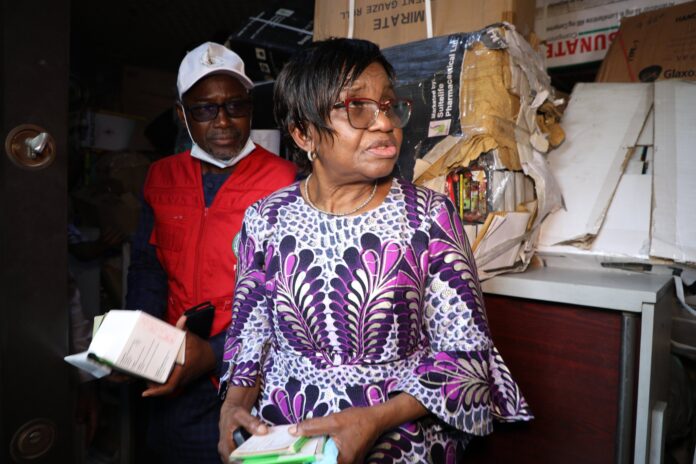In an impassioned defence of its nationwide operations aimed at ridding the country of substandard and dangerous drugs, the Director-General of the National Agency for Food and Drug Administration and Control (NAFDAC), Prof. Mojisola Adeyeye, has vehemently rejected claims made by Labour Party presidential candidate, Peter Obi, that the agency is disrupting trade and harming businesses.
In a statement delivered on Saturday in Lagos, Adeyeye emphasized that the agency’s ongoing efforts in cities like Lagos, Aba, and Onitsha are crucial for public safety and should not be politicized. The NAFDAC boss, visibly resolute, addressed the accusations, highlighting that the core focus of the agency’s enforcement operations was to safeguard the health of Nigerians, not to stifle business.
“We cannot afford to prioritize trade over the safety of lives,” Adeyeye said. “The operations in places like Lagos, Aba, and Onitsha are not about destroying businesses, but about saving lives. These markets have become hubs for the circulation of fake and substandard drugs that pose a severe threat to the health of Nigerians.”
The NAFDAC operations, which have included raids on drug markets in Lagos, Aba, and Onitsha, have led to the seizure of large quantities of banned and counterfeit drugs, including narcotics such as Tramadol and Anagin, which are prohibited in Nigeria due to their potential for abuse and harm. The agency has also uncovered disturbing evidence of illegal drug storage and distribution practices, particularly in Onitsha, one of the country’s largest open drug markets.
Peter Obi, who had earlier criticized the agency’s actions, suggested that NAFDAC’s enforcement efforts were excessive and were jeopardizing legitimate businesses. He particularly raised concerns about the agency’s closure of certain sections of Onitsha’s Bridgehead Market, a key trading hub, which he claimed were not involved in the drug trade.
However, Adeyeye hit back, making it clear that NAFDAC’s investigations had revealed dangerous substances being hidden in unsuspecting shops that were supposed to be selling plumbing materials. The illicit drugs, she said, were being secretly stored in these shops and, in some cases, packaged to look like legitimate products.
“Two trailer loads of unregistered narcotics, including banned tramadol, and counterfeit drugs were found hidden in shops that were not even supposed to be dealing with pharmaceuticals,” Adeyeye explained. “This is not a matter of shutting down legitimate trade; it is about stopping deadly drugs from entering the market and killing our people.”
The operation also unearthed a troubling discovery at the Idumota market in Lagos, where the agency found expired medications, including Amlodipine (used for high blood pressure), and improperly stored vaccines that could put HIV patients at risk. In a particularly chilling revelation, NAFDAC officials also uncovered USAID-donated antiretroviral drugs meant for HIV patients that had been stored improperly, putting thousands of vulnerable Nigerians in jeopardy.
“Vaccines were stored in unventilated warehouses instead of refrigerated conditions,” Adeyeye said. “This is completely unacceptable, especially when these drugs are meant to protect the lives of people living with HIV.”
The NAFDAC boss also pointed out that while her agency is committed to supporting legitimate trade, its primary responsibility remains the protection of Nigerian lives from counterfeit and substandard drugs. She refuted the accusation that NAFDAC was targeting legitimate traders and assured the public that the agency was well within its mandate to shut down illegal operations, especially those involved in the sale of life-threatening drugs.
“NAFDAC is not against trade. We have a dedicated office for trade and international relations to promote the growth of legal businesses,” Adeyeye emphasized. “But when it comes to matters of public health, we cannot and will not compromise.”
One of the most significant seizures in recent weeks occurred at Idumota market, where NAFDAC discovered expired condoms and controlled substances that were supposed to be destroyed long ago. The agency’s enforcement unit also confiscated two trucks that had arrived at midnight to evacuate illegally stored medicines, further highlighting the extent of the problem.
The scale of the problem, according to Adeyeye, cannot be overstated. She revealed that NAFDAC had seized over 11,000 shops that were found to be involved in the illegal trade of counterfeit and substandard drugs. Additionally, 40 people have been arrested during the ongoing operations, which have disrupted illicit drug networks across the country.
Despite the progress, Adeyeye admitted that NAFDAC is facing significant challenges in its fight against counterfeit drugs. The agency, she stated, is seriously understaffed, making it difficult to cover the country’s extensive borders and entry points effectively.
“We need more personnel to handle the volume of work,” she said. “We are stretched thin, and it is crucial that the government invests in the recruitment of more qualified staff to strengthen our efforts.”
The NAFDAC DG also pointed to the need for greater vigilance at Nigeria’s entry points, where counterfeit drugs often enter the country before being distributed to illegal markets. Without more resources, she warned, it would be difficult to fully combat the influx of these dangerous products.
The criticisms leveled by Peter Obi have sparked a heated debate across Nigeria, with some trade associations supporting NAFDAC’s efforts and others expressing concern about the impact on legitimate businesses. However, Adeyeye remained resolute in her stance, emphasizing that the agency would continue its operations until the menace of fake drugs is completely eradicated.
“We will not relent in this fight,” she declared. “We are here to protect the health of Nigerians, and that will always come first.”
The ongoing operation and subsequent raids have attracted widespread attention, with public health experts and civil society groups lauding NAFDAC for its commitment to safeguarding Nigerian lives. As the agency continues its crackdown, many are watching closely to see whether this battle against counterfeit drugs will ultimately lead to safer markets for all Nigerians.

